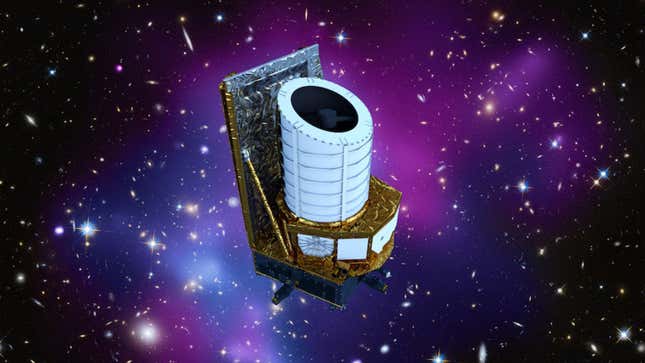
The European Space Agency’s Euclid telescope could launch on board a Falcon 9 rocket in 2023, a consequence of the space agency halting its cooperation with Russia and canceling its flights aboard Soyuz rockets.
The Euclid infrared space telescope was supposed to launch this year from Europe’s Spaceport in Kourou, French Guiana. However, Russia’s invasion of Ukraine and the subsequent sanctions imposed against its government has prompted ESA to sever its ties with the Russian space agency. Roscosmos also halted cooperation with Europe on Soyuz rocket launches from French Guiana and withdrew its 87 employees from the launch site. As a result, Euclid lost its ride to space on board Russia’s Soyuz rocket.
Europe began looking elsewhere for orbital flights, including the private space industry in the United States. ESA may be launching its Euclid mission on SpaceX’s Falcon 9 rocket in mid to late 2023, Mark Clampin, NASA’s director of the astrophysics division, said on Monday during a meeting of NASA’s Astrophysics Advisory Council, SpaceNews reported.
In an interview with Reuters in August, ESA’s Director General Josef Aschbacher said that the space agency is in preliminary discussions with Elon Musk’s SpaceX to use its rockets to transport its missions. At the time, ESA was weighing its options between SpaceX and rockets supplied by either Japan or India, but SpaceX is “the more operational of those and certainly one of the back-up launches we are looking at,” Aschbacher said.
ESA’s other option was Arianespace’s heavy-lift launch vehicle, but the French company has yet to launch its next-generation Ariane 6 rocket, the first flight of which won’t happen until next year. The space agency is currently under pressure to find replacements for Soyuz. “This was a wake up call, that we have been too dependent on Russia,” ESA’s Aschbacher told Reuters.
The European space agency isn’t alone in having to look for replacements to Russian rockets. In March, Russia halted its rocket engine supply to the U.S. in retaliation to the international sanctions imposed against its government. As a result, Northrop Grumman announced that it was partnering with Firefly Aerospace to build an all-domestic rocket to eliminate the need for Russian engines. Until the new rocket is ready, however, the company will also turn to SpaceX’s Falcon 9 rockets to deliver its Cygnus spacecraft to the International Space Station for cargo missions. Britain’s OneWeb was also forced to sign a contract with its rival SpaceX, and India’s space agency ISRO for six launches required to send its first generation internet satellites to orbit later this year after suspending its launches with Soyuz.
SpaceX is coming up as the most viable option to replace these suspended Soyuz flights, and the company is receiving new clientele from Europe. Falcon 9 is also scheduled to launch the Surface Water and Ocean Topography satellite in December 2022, a joint mission by NASA, the French space agency CNES, the Canadian Space Agency, and U.K. Space Agency.
Falcon 9 still has a whopping 18 launches left this year, but SpaceX’s workhorse needs to gear up for even more trips to orbit.
More: SpaceX Rival Loses Hundreds of Millions Over Cancelled Russian Launches